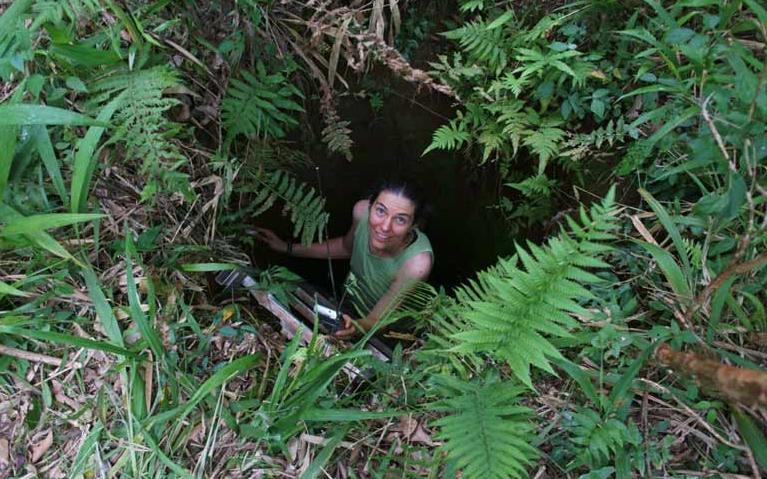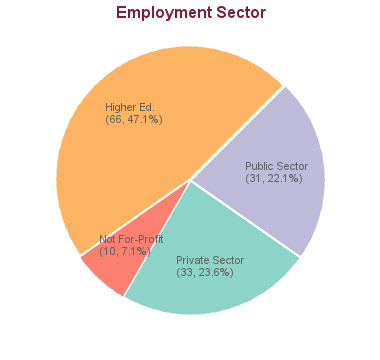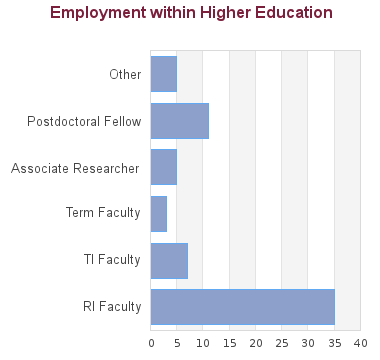
Kristina Cockle
Job Title
Research Scientist
Employer
CONICET

Review details about the recently announced changes to study and work permits that apply to master’s and doctoral degree students. Read more
Forestry graduate students learn from a dynamic and diverse group of researchers who educate and communicate how forests and the products that are created from them contribute to the well-being of all living things. The health and sustainability of forests and the people who depend on them underlies everything we do. We are among the best institutions globally in forest-related education and research and are also unique in the breadth of expertise we possess, which allows us to integrate new knowledge across many disciplines.
PhD in Forestry students can be found all over the world; they are important ambassadors for UBC Forestry and demonstrate just how diverse and international in scope the research is that is undertaken in our Faculty. We have approximately 130 doctoral students in any given year, which is about 40% of our total Forestry graduate student population. In addition to being part of the Faculty of Forestry, PhD students are also considered members of one of our three Faculty departments, based on their supervisor's affiliation.
The Faculty of Forestry offers excellent courses and cutting edge research across a spectrum of disciplines related to forestry, and opportunities for interdisciplinary learning. Graduate students work with leading scientists in state-of-the-art facilities within the Forest Sciences Centre and at any of two research forests.
We are one of the largest graduate units on campus, with over 300 students enrolled in our 7 degree programs. We attract students from around the world, with over 40 countries represented in our community. Given the global nature of modern forestry, the experience our students gain by working with colleagues from around the world is a subtle but effective means of creating the global citizens that UBC aspires to produce.
The major requirement for the PhD in Forestry is completion of a research dissertation which meets the requirements of the Faculty of Graduate & Post-doctoral Studies. Advancement to Candidacy must be achieved within 24 months of the start of studies, the requirements of which include a comprehensive examination. Course work is not required for the Forestry PhD, although many doctoral students do complete courses (either for credit or audit) as recommended by their supervisory committee.
The Faculty of Graduate and Postdoctoral Studies establishes the minimum admission requirements common to all applicants, usually a minimum overall average in the B+ range (76% at UBC). The graduate program that you are applying to may have additional requirements. Please review the specific requirements for applicants with credentials from institutions in:
Each program may set higher academic minimum requirements. Please review the program website carefully to understand the program requirements. Meeting the minimum requirements does not guarantee admission as it is a competitive process.
Applicants from a university outside Canada in which English is not the primary language of instruction must provide results of an English language proficiency examination as part of their application. Tests must have been taken within the last 24 months at the time of submission of your application.
Minimum requirements for the two most common English language proficiency tests to apply to this program are listed below:
Overall score requirement: 100
Reading
23
Writing
24
Speaking
22
Listening
23
Overall score requirement: 7.0
Reading
6.5
Writing
6.5
Speaking
6.5
Listening
6.5
Some programs require additional test scores such as the Graduate Record Examination (GRE) or the Graduate Management Test (GMAT). The requirements for this program are:
The GRE is not required.
Students admitted to the Ph.D. degree program normally possess a master's degree in Forestry or a related area, with clear evidence of research ability or potential. Transfer from the master's to the Ph.D. program is permitted under Faculty of Graduate and Postdoctoral Studies regulations. Exceptional students may be admitted directly to the Ph.D. program from the bachelor's level.
Deadline to submit online application. No changes can be made to the application after submission.
Transcript DeadlineDeadline to upload scans of official transcripts through the applicant portal in support of a submitted application. Information for accessing the applicant portal will be provided after submitting an online application for admission.
Referee DeadlineDeadline for the referees identified in the application for admission to submit references. See Letters of Reference for more information.
All applicants have to submit transcripts from all past post-secondary study. Document submission requirements depend on whether your institution of study is within Canada or outside of Canada.
A minimum of three references are required for application to graduate programs at UBC. References should be requested from individuals who are prepared to provide a report on your academic ability and qualifications.
Many programs require a statement of interest, sometimes called a "statement of intent", "description of research interests" or something similar.
Students in research-based programs usually require a faculty member to function as their thesis supervisor. Please follow the instructions provided by each program whether applicants should contact faculty members.
Securing the interest of a prospective faculty supervisor is a vital step in the PhD, MSc and MASc application process, and interest must be confirmed before you submit the online application. Using the prospective supervisor list at , carefully review faculty members whom you consider to be the best match with your research interests. Make a short-list of prospective supervisors and contact them to see if they are accepting new students. Remember that faculty members receive many inquiries, so generic e-mails may not receive a response. Make your correspondence stand out: tell potential supervisors about your background and interests and how this relates to their research area. As part of your conversation with a prospective supervisor, it is important to discuss funding. UBC Forestry requires that supervisors have a minimum funding package planned for the student prior to an Offer of Admission being issued. Your online application should only be submitted after a prospective supervisor has confirmed to you that they are interested in reviewing your application.
Permanent Residents of Canada must provide a clear photocopy of both sides of the Permanent Resident card.
All applicants must complete an online application form and pay the application fee to be considered for admission to UBC.
| Fees | Canadian Citizen / Permanent Resident / Refugee / Diplomat | International |
|---|---|---|
| Application Fee | $116.25 | $168.25 |
| Tuition * | ||
| Installments per year | 3 | 3 |
| Tuition per installment | $1,838.57 | $3,230.06 |
| Tuition per year (plus annual increase, usually 2%-5%) | $5,515.71 | $9,690.18 |
| Int. Tuition Award (ITA) per year (if eligible) | $3,200.00 (-) | |
| Other Fees and Costs | ||
| Student Fees (yearly) | $1,116.60 (approx.) | |
| Costs of living | Estimate your costs of living with our interactive tool in order to start developing a financial plan for your graduate studies. | |
Applicants to UBC have access to a variety of funding options, including merit-based (i.e. based on your academic performance) and need-based (i.e. based on your financial situation) opportunities.
From September 2024 all full-time students in UBC-Vancouver PhD programs will be provided with a funding package of at least $24,000 for each of the first four years of their PhD. The funding package may consist of any combination of internal or external awards, teaching-related work, research assistantships, and graduate academic assistantships. Please note that many graduate programs provide funding packages that are substantially greater than $24,000 per year. Please check with your prospective graduate program for specific details of the funding provided to its PhD students.
All applicants are encouraged to review the awards listing to identify potential opportunities to fund their graduate education. The database lists merit-based scholarships and awards and allows for filtering by various criteria, such as domestic vs. international or degree level.
Many professors are able to provide Research Assistantships (GRA) from their research grants to support full-time graduate students studying under their supervision. The duties constitute part of the student's graduate degree requirements. A Graduate Research Assistantship is considered a form of fellowship for a period of graduate study and is therefore not covered by a collective agreement. Stipends vary widely, and are dependent on the field of study and the type of research grant from which the assistantship is being funded.
Graduate programs may have Teaching Assistantships available for registered full-time graduate students. Full teaching assistantships involve 12 hours work per week in preparation, lecturing, or laboratory instruction although many graduate programs offer partial TA appointments at less than 12 hours per week. Teaching assistantship rates are set by collective bargaining between the University and the Teaching Assistants' Union.
Academic Assistantships are employment opportunities to perform work that is relevant to the university or to an individual faculty member, but not to support the student’s graduate research and thesis. Wages are considered regular earnings and when paid monthly, include vacation pay.
Canadian and US applicants may qualify for governmental loans to finance their studies. Please review eligibility and types of loans.
All students may be able to access private sector or bank loans.
Many foreign governments provide support to their citizens in pursuing education abroad. International applicants should check the various governmental resources in their home country, such as the Department of Education, for available scholarships.
The possibility to pursue work to supplement income may depend on the demands the program has on students. It should be carefully weighed if work leads to prolonged program durations or whether work placements can be meaningfully embedded into a program.
International students enrolled as full-time students with a valid study permit can work on campus for unlimited hours and work off-campus for no more than 20 hours a week.
A good starting point to explore student jobs is the UBC Work Learn program or a Co-Op placement.
Students with taxable income in Canada may be able to claim federal or provincial tax credits.
Canadian residents with RRSP accounts may be able to use the Lifelong Learning Plan (LLP) which allows students to withdraw amounts from their registered retirement savings plan (RRSPs) to finance full-time training or education for themselves or their partner.
Please review Filing taxes in Canada on the student services website for more information.
Applicants have access to the cost estimator to develop a financial plan that takes into account various income sources and expenses.
154 students graduated between 2005 and 2013: 2 are in non-salaried situations; for 12 we have no data (based on research conducted between Feb-May 2016). For the remaining 140 graduates:


These statistics show data for the Doctor of Philosophy in Forestry (PhD). Data are separated for each degree program combination. You may view data for other degree options in the respective program profile.
| 2023 | 2022 | 2021 | 2020 | 2019 | |
|---|---|---|---|---|---|
| Applications | 55 | 59 | 44 | 63 | 37 |
| Offers | 31 | 33 | 26 | 33 | 19 |
| New Registrations | 24 | 27 | 24 | 29 | 16 |
| Total Enrolment | 157 | 150 | 142 | 132 | 121 |
Students in research-based programs usually require a faculty member to function as their thesis supervisor. Please follow the instructions provided by each program whether applicants should contact faculty members.
Securing the interest of a prospective faculty supervisor is a vital step in the PhD, MSc and MASc application process, and interest must be confirmed before you submit the online application. Using the prospective supervisor list at , carefully review faculty members whom you consider to be the best match with your research interests. Make a short-list of prospective supervisors and contact them to see if they are accepting new students. Remember that faculty members receive many inquiries, so generic e-mails may not receive a response. Make your correspondence stand out: tell potential supervisors about your background and interests and how this relates to their research area. As part of your conversation with a prospective supervisor, it is important to discuss funding. UBC Forestry requires that supervisors have a minimum funding package planned for the student prior to an Offer of Admission being issued. Your online application should only be submitted after a prospective supervisor has confirmed to you that they are interested in reviewing your application.
These videos contain some general advice from faculty across UBC on finding and reaching out to a supervisor. They are not program specific.
| Year | Citation |
|---|---|
| 2019 | Dr. Thistlethwaite analysed the application of genomic based methodologies to conifer breeding. She used thousands of genetic markers to predict key economic traits, for the purpose of making selection decisions. Her research highlights areas for investment which will foster more dynamic and fruitful breeding programs in the future. |
| 2019 | Dr. Mpidi Bita evaluated the structural performance of tall wood buildings following extreme events, such as explosions and natural catastrophes. His research provides design guidance which may be used by structural engineers to ensure that buildings remains stable for sufficient time to allow for evacuation. |
| 2019 | Dr. Chavardes explored how drought influenced fires over time and space in western Canadian forests. He used weather and climate records, statistical models, tree-ring science, and fire-scar records to understand historical associations between droughts and fire. This work helps landscape managers foresee how future fires can be impacted by climate change. |
| 2019 | Dr. Lima studied logging activities in the Brazilian Amazon. She assessed selective logging patterns using remote sensing tools and was one of the first studies to analyze the new European satellite Sentinel-2. Findings will inform the academic community and governmental institutions concerned with forest monitoring and law enforcement. |
| 2019 | Dr. Vabi examined the link between public-private partnerships and corporate social responsibility. He identified conditions under which partnerships can be used to responsibly and efficiently drive community development. This research highlights one way corporations can successfully achieve sustainable development goals. |
| 2019 | Dr. Alharbi studied the genetic diversity, the population structure, and the phenotypic leaf variation among peripheral and core mangrove populations on the Red Sea. His study opened avenues for the advancement of the conservation and sustainable management of mangrove ecosystems on the Red Sea. |
| 2019 | Dr. Goodbody analyzed the potential of digital photogrammetry to provide data products and analytical methods to enhance forest inventories. With reference to its areas of success, limitation, and future directions, digital photogrammetry is justified as a technology capable of and improving forest resources monitoring and management. |
| 2019 | Dr. Cook monitored a set of parameters that evaluate the external condition, stress, and immune function among non-target salmon species that are discarded as bycatch. This research improves our understanding of the effects of acute stress on the physiology and survival of fish, and can be applied to improving the welfare of fishes discarded from fisheries. |
| 2019 | Dr. Akhtari studied bioenergy and biofuel production using forestry by-products in British Columbia. In her work, she developed decision making models that inform decisions related to designing a supply chain. This is aimed at generating additional revenue for the forest industry, and replacing fossil fuels with bioenergy in forest-dependent communities. |
| 2019 | Dr. Ratcliffe researched the integration of genomic information into tree breeding programs. He developed models for early prediction of key traits, such as tree height, from information contained in thousands of genetic markers. His research enables tree breeding programs to rapidly respond to market demands for forest products and emerging threats. |
Forestry offers advanced study in natural and social science, management, and economic aspects of forestry and wood science, in an interdisciplinary setting.
Departments/Programs may update graduate degree program details through the Faculty & Staff portal. To update contact details for application inquiries, please use this form.

Great academic programs, great location: the distinct seasons and mild climate are among the reasons why graduate students choose to study here -- from the autumn leaves to cherry blossoms, witness the many colours Vancouver has to offer.